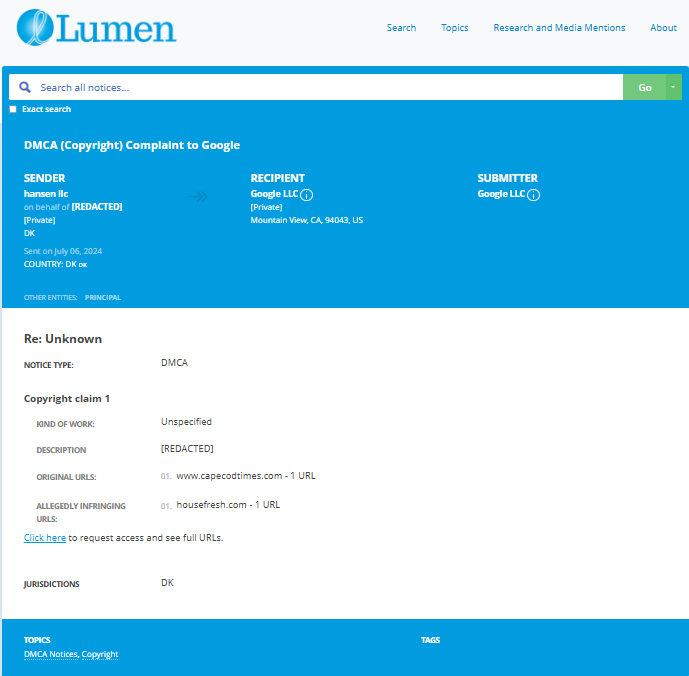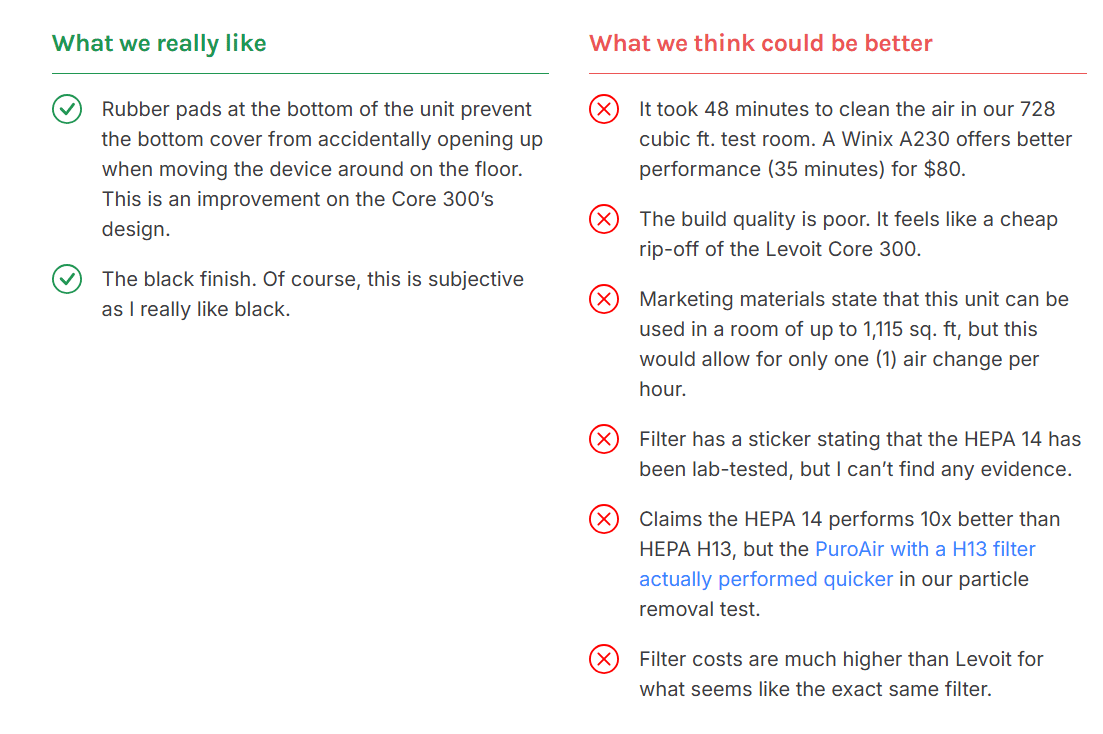
What We Are Investigating?
Our firm is launching a comprehensive investigation into PuroAir over allegations that it has been suppressing critical reviews and unfavorable Google search results by fraudulently misusing DMCA takedown notices. These actions, if proven, could constitute serious legal violations—including impersonation, fraud, and perjury.
We conducted comprehensive analyses of fraudulent copyright takedown requests, meritless legal complaints, and other unlawful efforts to suppress public access to critical information. Our reporting sheds light on the prevalence and modus operandi of a structured censorship network, often funded and used by criminal enterprises, oligarchs and criminal entities seeking to manipulate public perception and bypass AML checks conducted by financial organisations.
The fake DMCA notices in this investigation appears to have been strategically deployed to remove negative content from Google search results illegally. Based on this pattern, we have reasonable grounds to infer that PuroAir - or an entity acting at its behest - is directly or indirectly complicit in this cyber crime.
In most such cases, such ops are executed by rogue, fly-by-night 'Online Reputation Management' agencies acting on behalf of their clients. If evidence establishes that the subject knowingly benefited from or facilitated this scam, it may be deemed an 'accomplice' or an 'accessory' to the crime.

What are they trying to censor
Investigative Report: Allegations and Red Flags Surrounding PuroAir
PuroAir, a company specializing in air purification systems, has faced a series of allegations, red flags, and adverse news that have raised concerns about its business practices, product efficacy, and ethical standards. These issues have the potential to significantly harm the company’s reputation and credibility, prompting questions about its motivations to suppress damaging information, even if it means resorting to unethical or illegal means.
Major Allegations and Red Flags:
1. Misleading Marketing Claims:
PuroAir has been accused of exaggerating the capabilities of its air purifiers. Independent tests by consumer advocacy groups have shown that some of its products fail to meet the advertised performance standards, particularly in removing ultrafine particles and volatile organic compounds (VOCs). Critics argue that the company’s marketing materials mislead consumers into believing their devices are more effective than they truly are.
2. Questionable Certifications:
Investigations have revealed that PuroAir’s claims of certifications from reputable environmental and health organizations are either outdated or misleading. Some certifications appear to have been obtained through dubious means, raising concerns about the legitimacy of the company’s claims.
3. Customer Complaints and Poor Reviews:
Numerous customers have reported dissatisfaction with PuroAir’s products, citing issues such as short product lifespans, malfunctioning units, and poor customer service. Online reviews and consumer forums are rife with complaints, further damaging the company’s reputation.
4. Environmental and Ethical Concerns:
PuroAir has faced criticism for its environmental practices, including the use of non-recyclable materials in its products and a lack of transparency about its supply chain. Additionally, allegations have surfaced about the company sourcing components from suppliers with poor labor practices.
5. Legal and Regulatory Scrutiny:
PuroAir has been the subject of regulatory investigations in several jurisdictions for potential violations of consumer protection laws. These investigations focus on false advertising, failure to honor warranties, and non-compliance with environmental regulations.
6. Adverse Media Coverage:
Several high-profile media outlets have published investigative pieces highlighting PuroAir’s alleged misconduct. These stories have amplified the company’s negative image, leading to a decline in consumer trust and investor confidence.
Why PuroAir Would Want to Suppress This Information:
The allegations and adverse news surrounding PuroAir pose a significant threat to its reputation and bottom line. Misleading marketing claims and questionable certifications undermine consumer trust, while poor reviews and customer complaints deter potential buyers. Environmental and ethical concerns alienate socially conscious consumers, and legal scrutiny could result in hefty fines and operational restrictions. Adverse media coverage exacerbates these issues, creating a cycle of negative publicity that is difficult to break.
In this context, PuroAir may feel compelled to remove or suppress damaging information to protect its brand and maintain market share. The company’s desire to control the narrative could lead to extreme measures, including cybercrime. For instance, hacking into consumer review platforms to delete negative feedback, infiltrating media outlets to retract stories, or launching disinformation campaigns to discredit critics could be seen as desperate attempts to salvage its reputation.
However, such actions would not only be illegal but also further erode trust in the company. The ethical and legal ramifications of resorting to cybercrime would far outweigh any short-term benefits, potentially leading to criminal charges, civil lawsuits, and irreversible damage to PuroAir’s credibility.
In conclusion, while the allegations against PuroAir are serious and damaging, the company’s potential resort to cybercrime to suppress this information would represent a dangerous escalation, compounding its existing problems and exposing it to even greater risks.
- https://lumendatabase.org/notices/42860891
- July 06, 2024
- hansen llc
- https://www.capecodtimes.com/story/news/2010/01/27/okla-man-accused-murder-kidnapping/51725309007/
- https://housefresh.com/puroair-hepa-14-240-review
Evidence Box
Evidence and relevant screenshots related to our investigation


























Targeted Content and Red Flags
lexology.com
National Advertising Division Finds Certain HEPA Claims for PuroAir 400 Air Purifiers and Filters Supported
- Adverse News

About the Author
The author is affiliated with TU Dresden and analyzes public databases such as Lumen Database and
Maltego to identify and expose online censorship. In his personal capacity, he and his
team have been actively investigating and reporting on organized crime related
to fraudulent copyright takedown schemes.
Additionally, his team provides
advisory services to major law firms and is frequently consulted on matters
pertaining to intellectual property law.
Escalate This Case


Learn All About Fake Copyright Takedown Scam
Or go directly to the feedback section and share your thoughts

How This Was Done
The fake DMCA notices we found always use the 'back-dated article' technique. With this technique, the wrongful notice sender (or copier) creates a copy of a 'true original' article and back-dates it, creating a 'fake original' article (a copy of the true original) that, at first glance, appears to have been published before the true original

What Happens Next?
Based on the feedback, information, and requests received from all relevant parties, our team will formally notify the affected party of the alleged infringement. Following a thorough review, we will submit a counter-notice to reinstate any link that has been removed by Google, in accordance with applicable legal provisions. Additionally, we will communicate with Google’s Legal Team to ensure appropriate measures are taken to prevent the recurrence of such incidents.


You are Never Alone in Your Fight.
Generate public support against the ones who wronged you!




Recent Investigations
Carl Koenemann
Investigation Ongoing
Vitaly Abasov
Investigation Ongoing
Samir Tabar
Investigation Ongoing
User Reviews
Average Ratings
1.8
Based on 8 ratings
by: Wyatt Singh
I trusted PuroAir’s supposed certifications and spent $900, but it doesn’t work as advertised and the company refuses to refund me.
by: Mila Novak
I spent $1,200 on a PuroAir purifier, only to find out it doesn’t do anything it promises total waste and regret.
by: Ethan Phillips
Their so-called certifications are nothing more than a cover-up for poor quality. Outdated and questionable, these certifications do nothing to legitimize PuroAir’s business practices.
by: Lily Evans
PuroAir’s attempt to cover up their shady dealings is evident. They’re desperate to keep the negative press out of sight, but it’s clear as day that they have something to hide.
by: Benjamin Brooks
PuroAir’s marketing is pure fiction. Their air purifiers don’t do half of what they claim. Independent tests show their products fall short sounds more like a scam than a solution.
by: Ameerah Cooper
Their certifications look impressive until you realize some are fake or outdated. Total scam move.
by: Nola Cruz
Bought it for my son’s allergies, but it broke down after a few months. Support was nonexistent. Total waste of money.
by: Ainsley Phillips
The purifier didn’t work as advertised barely made a difference in air quality. I feel completely misled by their marketing.
by: Phillip Anderson
This is blatant defamation - from the looks of it this company is donating to wildfire victims, contributing to research studies and the public loves the products. They also have someone from the EPA, Harvard and MIT on their board,...
by: Xavier James
While the report highlights concerns about misleading marketing and questionable certifications, it does not provide any official statements from regulators or industry experts to validate these accusations, raising doubts about the credibility of the claims.
by: Aurora Patterson
The report implies unethical certifications but does not cite any official findings or regulatory actions proving fraudulent accreditation.
by: Eli Russell
Customer complaints and poor reviews are mentioned as a significant issue, but there is no statistical analysis to determine whether these complaints represent a widespread problem or just isolated incidents. The absence of such data weakens the argument that the...
by: Penelope Coleman
The claim that PuroAir may resort to cybercrime is highly speculative and borders on defamation without substantive proof.
Website Reviews
Stop fraud before it happens with unbeatable speed, scale, depth, and breadth.
Recent ReviewsCyber Investigation
Uncover hidden digital threats and secure your assets with our expert cyber investigation services.
Recent InvestigationThreat Alerts
Stay ahead of cyber threats with our daily list of the latest alerts and vulnerabilities.
Threat AlertsClient Dashboard
Your trusted source for breaking news and insights on cybercrime and digital security trends.
Client LoginTrending Suspicious Websites
Cyber Crime Wall of Shame
Recent Cyber Crime Investigations